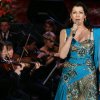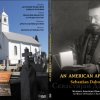WASHINGTON – Prima donna of the Belgrade opera and world-renowned mezzo-soprano Jadranka Jovanovic staged a concert at the Kennedy Center in Washington on Monday with a varied setlist including arias and songs from Serbia and other countries.
In the hour-long concert entitled “A Rainbow of Music Serbian Quartet,” she was accompanied by baritone Dimitrije Lazic, and pianists Nikola Rackov and Djordje Nesic.
They performed works of Mokranjac, Tchaikovsky, Rachmaninoff and several standards.
.The concert was organized by the Serbian Embassy in Washington, and the audience included Ambassador Vladimir Petrovic and notable members of the Serbian diaspora such as analyst and consultant Obrad Kesic, head of the South Slavic Collections at the Library of Congress Predrag Pajic, and Serbia’s representative at the World Bank Vlajko Senic.
The U.S. tour started on May 24 with a big concert in Boston, and will wrap up with in New York on June 22, when the Serbian artists will stage a musical evening in cooperation with the Serbian church of St. Sava as a sign of gratitude to the Serbian diaspora.
Source: InSerbia.Info
Link: ПОЛИТИКА





